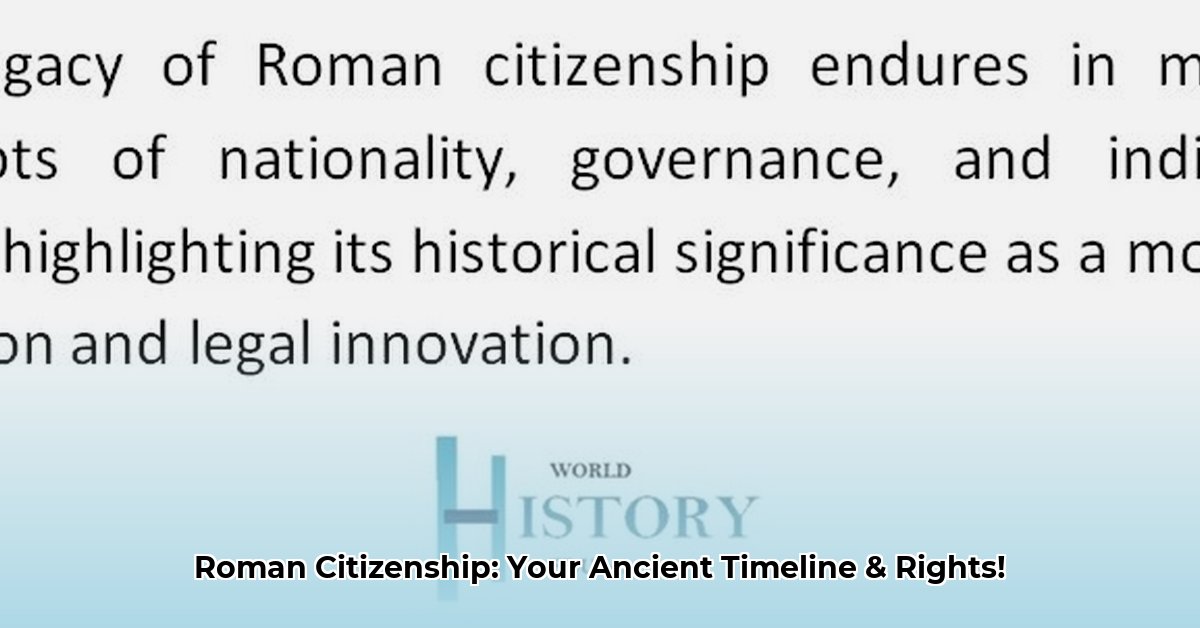Ever wondered what it was like to be an insider in ancient Rome? Possessing Roman citizenship was far more than a mere formality; it was akin to holding a golden ticket, a symbol of immense privilege that profoundly shaped an individual’s life and, indeed, the very trajectory of Rome’s monumental rise and enduring legacy. Initially, this coveted status was largely hereditary, primarily reserved for the esteemed residents of Rome itself and its immediate environs. This unique form of civitas came with a distinct set of legal rights, responsibilities, and social perks, profoundly influencing one’s standing within Roman society.
Yet, as Rome expanded its dominion from a city-state to a vast, sprawling empire, the criteria for earning that esteemed golden ticket grew progressively more complex and inclusive, sparking significant internal conflicts, most notably the pivotal Social War. This article delves into the comprehensive story of Roman citizenship—from its inherent benefits and stringent requirements for attainment to the sweeping Edict of Caracalla, which, by extending citizenship broadly across the empire, may have paradoxically diminished its exclusive value while simultaneously forging a more unified imperial identity.
The Foundations and Evolution of Roman Citizenship
Initially, becoming a citizen in ancient Rome was a hard-won status, a true badge of honor reserved for a select few. It stood as a special perk, defining one’s legal standing and social opportunities. Imagine it as membership in an exceptionally exclusive club, offering unparalleled advantages within the burgeoning Roman Republic. However, as the Roman state expanded its military and political influence, citizenship began to be strategically utilized—evolving into a powerful, pragmatic tool for maintaining control, fostering loyalty, and effectively integrating newly conquered populations. This adaptive approach eventually culminated in a monumental shift, where nearly every free individual residing within the vast Roman Empire attained citizenship. How did this profound transformation unfold over centuries? Let’s explore its origins and intricate evolution.
Early Republic: An Exclusive Status Defined
During the nascent period of the Roman Republic (c. 509–264 BCE), possessing citizenship was a profoundly significant distinction, and access was highly restricted. It conferred specific legal rights and vital protections, fundamentally separating citizens (cives Romani) from non-citizens (peregrini). For instance, citizens held the inherent right to a fair trial if accused of an offense, and they could legally own and transfer property (ius commercii). This status granted access to a significantly elevated standard of living and legal standing within Roman society.
The earliest codification of Roman law, the Twelve Tables (c. 450 BCE), established the foundational rights and duties of citizens. Publicly displayed in the Roman Forum, these laws ensured transparency and accessibility, covering critical aspects of civic life, including court proceedings, property ownership, inheritance, and public behavior. Furthermore, the Roman Census, conducted every five years, was a critical administrative tool. It meticulously recorded citizens, their households, and property, serving as the basis for taxation, military recruitment, and political organization (comitia centuriata). As Rome expanded, the census evolved into a mechanism for integrating new territories into the empire’s administrative system, ensuring order and resource management.
Pathways to Citizenship: From Birthright to Merit
While birth to free Roman parents (civis Romanus) remained the most common path to citizenship, Rome’s pragmatic approach to governance led to the development of other significant avenues:
- Military Service: As Rome’s military and political influence expanded across the Mediterranean, so did its demand for loyal soldiers. To incentivize broader participation, citizenship began to be offered as a reward for distinguished military service. Non-citizens, primarily provincials, could serve in the auxiliary forces (auxilia) for a specified period, typically 25 years. Upon honorable discharge, they, and often their children, were granted full Roman citizenship. This promise was undeniably a compelling proposition, motivating countless individuals to serve in the formidable Roman legions or their support units, earning not only land and material wealth but also the coveted status of a Roman citizen.
- Individual Grants and Charters: Citizenship could be conferred by Roman officials or emperors as a reward for exceptional loyalty, service, or merit. Collective grants were also common, where entire communities or cities could gain citizenship, often through municipal charters under the “Latin Law” (ius Latii). This effectively integrated local elites into the Roman system, fostering stability and reducing the likelihood of rebellion.
- Manumission of Slaves: Uniquely in the ancient world, Roman slaves (servi) could earn or be granted their freedom through manumission (manumissio). Once freed, they typically acquired the status of freedmen (liberti). While freedmen faced certain limitations (e.g., generally barred from holding executive magistracies), their children were born as full, free Roman citizens. This pathway provided a powerful mechanism for social mobility and integration, distinguishing Rome’s approach to slavery from that of many other ancient societies.
These diverse pathways strategically aided in integrating conquered peoples and loyal populations into the wider Roman social fabric. When individuals shared common rights and responsibilities, it fostered greater loyalty, a stronger willingness to assimilate into the Roman system, and a deeper sense of belonging to the Romanitas, or “Roman way of life.”
The Edict of Caracalla: Universal Citizenship and Its Ramifications
In 212 CE, a truly monumental event transpired: the issuance of the Edict of Caracalla, formally known as the Constitutio Antoniniana. This groundbreaking decree, promulgated by Emperor Marcus Aurelius Severus Antoninus Augustus, universally declared that virtually all free individuals living within the Roman Empire were now considered full Roman citizens. This represented an unprecedented and sweeping shift in the very definition of Roman identity and participation. It was as if the long-guarded gates of that exclusive club were suddenly flung wide open, inviting almost everyone inside.
The precise motivations behind this far-reaching edict remain a subject of intense historical debate. Some scholars posit that a primary driver was the empire’s pressing need to increase its tax revenue. Only Roman citizens were subject to certain taxes, such as the centesima rerum venalium (a 1% sales tax on goods) and specific inheritance taxes (vicesima hereditatium). By dramatically expanding the tax base, Caracalla could significantly bolster the imperial treasury, which was perpetually strained by costly military campaigns and ambitious building projects. Others argue that the edict genuinely aimed to foster a more unified Roman identity and promote widespread loyalty across the immense, multicultural empire, integrating diverse populations under a single, overarching Roman law. A larger pool of citizens could also theoretically enhance military recruitment for the legions, as Roman citizens were eligible for compulsory service. The true motivation likely encompassed a complex interplay of these fiscal, social, and military strategic factors.
Regardless of the nuanced interpretations, this act irrevocably altered what it meant to be Roman. While it brought legal uniformity, it also arguably diluted the inherent value and prestige of Roman citizenship. When a status becomes universal, its exclusivity and the unique privileges it once conferred can diminish in perceived importance. The edict transformed citizenship from a hard-earned privilege into a legal formality, impacting aspects like civic participation and the distinctiveness of Roman identity.
Navigating the Legal Landscape: Ius Civile and Ius Gentium
With the dramatic increase in the number of citizens and the expansion of the Roman Empire, the legal system within ancient Rome became considerably more intricate. This complexity was managed through the interplay of two primary legal frameworks:
- Ius Civile (Civil Law): This body of law specifically governed the rights, duties, and protections of Roman citizens (cives Romani). It was deeply rooted in ancient Roman traditions, customs (mores maiorum), and specific legislation like the Twelve Tables. The ius civile was often characterized by its rigid formalism and applied exclusively to matters involving citizens, such as property ownership, contracts, and family law.
- Ius Gentium (Law of Nations): Developed by the Romans, particularly the praetor peregrinus (magistrate dealing with foreigners), this was a more universal system of law. It arose from the practical necessity of administering justice in cases involving foreigners (peregrini) or disputes between Romans and non-Romans. The ius gentium was less formal and more flexible, drawing upon common principles of justice and mercantile practices observed across the Mediterranean world. As the empire grew and citizenship expanded, ius gentium increasingly influenced and eventually merged with aspects of ius civile, becoming a fundamental component of Roman jurisprudence applicable to all free inhabitants.
This inherent dualism could initially create complexities in determining which legal framework applied to whom in various situations. However, over time, the more adaptable ius gentium gradually softened the rigidities of the ius civile, creating a more comprehensive and coherent legal system capable of governing a vast and diverse empire. This legal evolution underscored the inherent challenges of administering an empire encompassing a multitude of distinct customs and traditions. The fundamental concept of Roman civitas evolved from an identity rooted purely in ethnicity to a far more inclusive legal and cultural framework.
Rights, Privileges, and Responsibilities of Roman Citizens
Roman citizenship conferred a vast array of substantial advantages, distinctly separating citizens from non-citizens and fostering a powerful sense of shared identity within the Roman commonwealth. However, these extensive rights were accompanied by commensurate responsibilities, reflecting the reciprocal relationship between the individual and the state.
Political Rights
- Ius Suffragii (Right to Vote): Male citizens could vote in the various assemblies (comitia), influencing the election of magistrates and the passage of laws. While theoretically universal for male citizens, practical limitations often made exercising this right exceedingly difficult for those residing far from Rome. Travel to the capital for elections was arduous and costly, and the established system of vote counting (e.g., by centuries or tribes) disproportionately favored the votes of wealthier citizens, granting them greater influence.
- Ius Honorum (Right to Hold Public Office): Full citizens, particularly those from the elite patrician and later equestrian classes, were eligible to hold civil and military positions within the cursus honorum (sequence of public offices). This was a key pathway to prestige, power, and influence within Roman society, though it remained largely dominated by the aristocracy.
Legal Protections
- Ius Provocationis (Right to Appeal): Citizens had the fundamental right to appeal a magistrate’s decision, especially a capital sentence, to the people’s assembly (or later, to the Emperor). This acted as a vital safeguard against arbitrary power and ensured due process. As exemplified by the Apostle Paul in the Bible’s Book of Acts, this right allowed Roman citizens accused of crimes in the provinces to demand a trial in Rome or appeal to the Emperor, preventing mistreatment by local authorities.
- Immunity from Torture and Humiliating Punishments: Roman citizens could not be tortured or subjected to certain brutal and humiliating punishments, such as crucifixion, which were typically reserved for non-citizens, slaves, or those found guilty of treason (in which case, capital punishment would be by beheading). This protection underscored the elevated status of Roman citizens.
- Right to a Legal Trial: Citizens were entitled to a formal legal trial before being punished for any crime, ensuring adherence to established legal procedures (ius iudicium).
Economic and Social Rights
- Ius Commercii (Right to Property and Contracts): Citizens could legally own, inherit, and transfer Roman land and property. They also had the right to enter into legally binding contracts and engage in commercial dealings, a critical aspect of Rome’s vibrant economy.
- Ius Conubii (Right to Lawful Marriage): Citizens could marry other citizens, and crucially, children born from such unions would automatically inherit Roman citizenship. This right was essential for maintaining family status, ensuring legitimacy, and securing inheritance rights.
- Tax Benefits and Immunities: While citizens paid taxes based on their census status, they were often exempt from certain provincial taxes and levies imposed on non-citizens, making citizenship highly desirable. They could also be relieved from specific local public duties.
Civic and Military Responsibilities
- Military Service (Ius Militiae): Male citizens were obligated to serve in the Roman legions, particularly during the Republic. This was both a fundamental duty and an opportunity to gain land, wealth, and social status. Military service was seen as a cornerstone of Roman identity and a vital contribution to state security.
- Taxation: Citizens paid taxes based on their wealth and census registration. Wealthier citizens were also culturally expected to contribute to public welfare by financing public projects (munera publica), such as building roads, temples, or hosting games and festivals, further enhancing their social standing.
- Civic Participation: Beyond voting, citizens were expected to actively participate in the political and social life of the Republic, attending assemblies, observing religious rites, and adhering to Roman laws and customs. Failure to perform citizenship duties could result in the loss of privileges, as seen during the Second Punic War when men who refused military service lost their right to vote.
The Social War (91–87 BCE): A Defining Conflict for Citizenship
The Social War stands as a watershed moment in Roman history, a brutal and transformative conflict triggered by the profound dissatisfaction of Rome’s Italian allies (socii) regarding their denied access to full Roman citizenship. These allies bore a disproportionate share of Rome’s military burdens without commensurate political representation or legal protections, leading to deep-seated resentment and an existential crisis for the Republic.
Seeds of Discontent: The Allies’ Burden and Latin Rights
For generations, Rome’s ascendance and military might relied heavily on the unwavering support and resources provided by its Italian partners. These socii, drawn from various Italic peoples, faithfully served in Rome’s legions, bleeding for its expansion and contributing significantly to its wealth. Yet, they possessed virtually no voice in Rome’s crucial political decisions, lacked the full ius conubii with Roman citizens (preventing their children from automatically becoming citizens), and were vulnerable to the whims of Roman magistrates without ius provocationis. This glaring inequality fostered deep-seated resentment.
While some communities, particularly certain Latin city-states, enjoyed Latin Rights (Ius Latii), which offered a degree of legal and economic privilege—allowing for intermarriage and commerce with Roman citizens as well as the right to migrate to Rome and gain full citizenship—these rights still fell short of the comprehensive advantages of full Roman citizenship. Other allied communities, the socii, received even fewer rights, despite their indispensable role in Rome’s formidable military apparatus, composing two-thirds of the Roman army by 100 BCE. Their collective voices, crucial to Rome’s stability, remained largely unheard, fueling a mounting tide of frustration.
Political Failures and Rising Tensions
The persistent denial of full citizenship became the central and most contentious issue. The socii endured a heavy burden of military conscription and taxation, yet they remained largely devoid of substantive political influence within the Roman system. Repeated attempts by progressive political figures, such as the Gracchi brothers (Tiberius and Gaius Gracchus in 133 and 122 BCE, respectively), and later Marcus Livius Drusus (91 BCE), to address these grievances through legislative reform ultimately met with violent failure. Gaius Gracchus’s proposal to grant full citizenship to all Italian allies, for instance, faced opposition not only from the conservative Roman elite (optimates) but also from some plebeians who feared increased competition for resources. As frustration intensified, fueled by unmet demands and perceived injustices, armed rebellion transitioned from a distant threat to a grim inevitability following Drusus’s assassination.
A Brutal Conflict and Rome’s Response
The Social War (also known as the Marsic War) violently erupted across the Italian peninsula in 91 BCE. The Italian rebels, in a remarkable act of defiance, formed their own confederation, boldly named “Italia,” with its capital at Corfinium, and issued a clear ultimatum: either full Roman citizenship or complete independence. The ensuing war, characterized by its brutal intensity and high casualties, starkly revealed underlying weaknesses within Rome’s military and political structures. It underscored, with stark clarity, just how profoundly Rome depended on its Italian allies for crucial manpower, stretching its resources to their limits.
Rome’s response to the widespread rebellion was multifaceted, employing both decisive military force and strategic political concessions. Renowned generals of the era, such as Lucius Cornelius Sulla and Gnaeus Pompeius Strabo, were dispatched to vigorously suppress the widespread rebellion. Concurrently, Rome strategically began offering citizenship to allied communities who chose to surrender and lay down their arms. The Lex Julia (90 BCE) was a key legislative act that granted Roman citizenship to Latin and Italian communities that had either remained loyal or had ceased their rebellion. Subsequent laws, such as the Lex Plautia Papiria (89 BCE), further extended these rights to those who reconciled with Rome, slowly but surely bringing vast new populations into the Roman fold across Italy south of the Po River.
The Aftermath: A Unified Roman Italy, New Challenges
The Social War left an indelible mark on Roman history, fundamentally reshaping the course of the Republic. The extension of citizenship to the entire Italian peninsula effectively integrated Italy under a more unified Roman rule, dissolving many of the previous distinctions between Roman citizens and allies. This massive expansion of the citizen body, which nearly tripled overnight, posed significant new administrative and political challenges. The influx of new voters strained Rome’s established political system, particularly the assemblies, which were still based on the old city-state model.
The Social War also sharply exacerbated existing divisions within Roman society and its political elite. The populist faction (populares), generally advocating for reforms and broader inclusion, largely supported the extension of citizenship. In stark contrast, the conservative aristocratic faction (optimates), staunch defenders of traditional power and privilege, vehemently resisted such radical change. This profound ideological conflict further polarized these influential factions, significantly contributing to the escalating instability and eventual downfall of the Roman Republic, paving the way for the rise of powerful military figures and the transition to the Empire.
Women’s Experience of Roman Citizenship
While Roman citizenship represented a
- Unearth ancient rome roads: Empire’s power and modern highway’s origin - August 15, 2025
- Discover geography of ancient Rome: Empire’s secrets revealed (2024 insights) - August 15, 2025
- Unveiling Ancient Roman Empire Geography: Power & Legacy Secrets - August 15, 2025
















